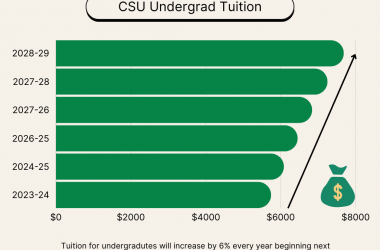The California State University Board of Trustees approved a new food policy that would require the CSU system to spend over $20 million on more sustainable food products.
The food policy, which was voted on May 21, will follow Real Food Challenge guidelines, a national organization partly founded by the California Student Sustainability Coalition in 2008. Criteria include spending 20 percent of the CSU food budget on local farmers and food business, according to a press release.
David Schwartz, the director of the campaign, said that as a result, CSU dinning halls and cafeterias will now have 20 percent more sustainable food.
“None of this would have happened if it weren’t for the incredible leadership and advocacy of CSU students,” Schwartz said.
This approval exemplified how student voice can make a difference throughout the Board decisions, he said.
He said that students were very “instrumental” in going to the Board meetings every single time to testify to their vision. They were very persistent, he said.
Schwartz said that the Real Food Calculator, which is a sustainability assessment tool, is used as part of the Real Food Challenge goal and the basis of the new policy.
Using the Real Food Calculator, he said that students can determine if a CSU’s current purchases meet that sustainable food criteria and compare them amongst each other. Schwartz said that this research tool is very interactive because it’s student investigative work about their campuses’ food source.
The Real Food Challenge guidelines are measured by first setting aside “disqualifiers,” and then meeting a categorical criteria, he said.
Ingredients such as hydrogenated oil or excess potassium, for example, would be ruled out from the sustainability requirements as disqualifiers, Schwartz said.
On top of that, Schwartz said that the Real Food Challenge four-category criteria is based on how humane, ecological sound, financially fair and how locally based the food is.
“I think this is why these standards were chosen,” he said.
Currently, these standards are being used by over 100 campuses across the nation, Schwartz said.
“CSU’s are really leading the way — showing that more and more schools should be serious about this,” he said.
Michael Clemson, an Associate Energy Analyst at the CSU Chancellor’s office, said that the campuses where the students are more engaged and involved, such as Cal State Long Beach, have better sustainability programs.
Clemson said that students governing the food sustainability programs will be in charge of making sure that the programs are run successfully .
“Ultimately, it’s the campus that’s going to have to do it, but students will be directly impacted by it,” he said.
The University of California system has a nearly identical policy, Clemson said.
Schwartz said that 25 other campuses across the nation have also signed a similar pledge.
He said that he still wants to increase the percentage of food sustainability on campuses later in the future.
Given that $18 billion are spent on food industries for campuses, the CSU system — which is the largest school systems in the country — will cause “huge ripple effects” for other school systems nationally, Schwartz said.
“The fact that the CSU system took such a strong message about ‘[wanting] healthy and sustainable food,’ it has the potential to really start to change the industry as a whole,” he said. “I think it’s an incredibly powerful thing.”
According to a press release, the CSU system has a budget of $100 million to spend on food. Out of that amount, over $20 million will be used to meet the new sustainability policy by 2020.
Schwartz said that the 20 percent allocated for spending for local farming and food businesses would equal to about $25 million for those businesses.
“At the same time, it’s ridiculous that it’s only 20 percent,” Schwartz said. “It’s not enough over time, but it’s a really positive first step.”
Single-subject credential program student Michael Orrison, who said that he eats out often on campus, said he agrees. “I think any improvement is just that, an improvement,” Orrison said.
Junior nutrition and dietetics major Gabriela Obregon said that she thinks that because campuses do what’s more convenient and cheap, the Board’s approval of a new sustainability policy means that they have “an interest in what students are putting inside their bodies.”
“Since it’s a new idea, we need to get as much [support] as possible,” she said.




